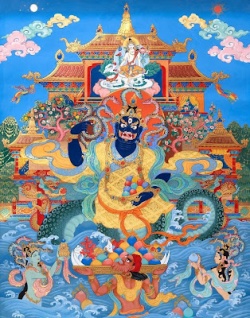Difference between revisions of "Anatta-lakkhana Sutta"
| Line 11: | Line 11: | ||
<poem> | <poem> | ||
| − | [[Anatta-lakkhana Sutta]]: The [[Discourse on the Not-self Characteristic]] | + | [[Anatta-lakkhana Sutta]]: The [[Discourse on the Not-self Characteristic]] translated from the [[Pali]] by [[Ñanamoli Thera]] |
| − | translated from the [[Pali]] by | ||
| − | [[Ñanamoli Thera]] | ||
© 1993–2013 | © 1993–2013 | ||
| + | |||
Alternate translations: Mendis | [[Thanissaro]] | Alternate translations: Mendis | [[Thanissaro]] | ||
| + | |||
Alternate format: [SuttaReadings.net icon] | Alternate format: [SuttaReadings.net icon] | ||
| + | |||
| + | |||
Thus I [[heard]]. On one occasion the [[Blessed One]] was living at [[Benares]], in the [[Deer Park]] at [[Isipatana]] (the [[Resort of Seers]]). There he addressed the [[bhikkhus]] of the group of five: "[[Bhikkhus]]." — "[[Venerable]] sir," they replied. The [[Blessed One]] said this. | Thus I [[heard]]. On one occasion the [[Blessed One]] was living at [[Benares]], in the [[Deer Park]] at [[Isipatana]] (the [[Resort of Seers]]). There he addressed the [[bhikkhus]] of the group of five: "[[Bhikkhus]]." — "[[Venerable]] sir," they replied. The [[Blessed One]] said this. | ||
"[[Bhikkhus]], [[form]] is [[not-self]]. Were [[form]] [[self]], then this [[form]] would not lead to [[affliction]], and one could have it of [[form]]: 'Let my [[form]] be thus, let my [[form]] be not thus.' And since [[form]] is [[not-self]], so it leads to [[affliction]], and none can have it of [[form]]: 'Let my [[form]] be thus, let my [[form]] be not thus.' | "[[Bhikkhus]], [[form]] is [[not-self]]. Were [[form]] [[self]], then this [[form]] would not lead to [[affliction]], and one could have it of [[form]]: 'Let my [[form]] be thus, let my [[form]] be not thus.' And since [[form]] is [[not-self]], so it leads to [[affliction]], and none can have it of [[form]]: 'Let my [[form]] be thus, let my [[form]] be not thus.' | ||
| + | |||
"[[Bhikkhus]], [[feeling]] is [[not-self]]... | "[[Bhikkhus]], [[feeling]] is [[not-self]]... | ||
| Line 27: | Line 30: | ||
"[[Bhikkhus]], [[determinations]] are [[not-self]]... | "[[Bhikkhus]], [[determinations]] are [[not-self]]... | ||
| + | |||
| + | |||
"[[Bhikkhus]], [[consciousness]] is not [[self]]. Were [[consciousness]] [[self]], then this [[consciousness]] would not lead to [[affliction]], and one could have it of [[consciousness]]: 'Let my [[consciousness]] be thus, let my [[consciousness]] be not thus.' And since [[consciousness]] is [[not-self]], so it leads to [[affliction]], and none can have it of [[consciousness]]: 'Let my [[consciousness]] be thus, let my [[consciousness]] be not thus.' | "[[Bhikkhus]], [[consciousness]] is not [[self]]. Were [[consciousness]] [[self]], then this [[consciousness]] would not lead to [[affliction]], and one could have it of [[consciousness]]: 'Let my [[consciousness]] be thus, let my [[consciousness]] be not thus.' And since [[consciousness]] is [[not-self]], so it leads to [[affliction]], and none can have it of [[consciousness]]: 'Let my [[consciousness]] be thus, let my [[consciousness]] be not thus.' | ||
"[[Bhikkhus]], how do you [[conceive]] it: is [[form]] [[permanent]] or [[impermanent]]?" — "[[Impermanent]], [[venerable]] Sir." — "Now is what is [[impermanent]] [[painful]] or [[pleasant]]?" — "[[Painful]], [[venerable]] Sir." — "Now is what is [[impermanent]], what is [[painful]] since [[subject]] to change, fit to be regarded thus: 'This is mine, this is I, this is my [[self]]'"? — "No, [[venerable]] sir." | "[[Bhikkhus]], how do you [[conceive]] it: is [[form]] [[permanent]] or [[impermanent]]?" — "[[Impermanent]], [[venerable]] Sir." — "Now is what is [[impermanent]] [[painful]] or [[pleasant]]?" — "[[Painful]], [[venerable]] Sir." — "Now is what is [[impermanent]], what is [[painful]] since [[subject]] to change, fit to be regarded thus: 'This is mine, this is I, this is my [[self]]'"? — "No, [[venerable]] sir." | ||
| + | |||
| + | |||
[[File:25dd04.jpg|thumb|250px|]] | [[File:25dd04.jpg|thumb|250px|]] | ||
"Is [[feeling]] [[permanent]] or [[impermanent]]?... | "Is [[feeling]] [[permanent]] or [[impermanent]]?... | ||
| Line 37: | Line 44: | ||
"Are [[determinations]] [[permanent]] or [[impermanent]]?... | "Are [[determinations]] [[permanent]] or [[impermanent]]?... | ||
| + | |||
| + | |||
"Is [[consciousness]] [[permanent]] or [[impermanent]]?" — "[[Impermanent]], [[venerable]] sir." — "Now is what is [[impermanent]] [[pleasant]] or [[painful]]?" — "[[Painful]], [[venerable]] sir." — "Now is what is [[impermanent]], what is [[painful]] since [[subject]] to change, fit to be regarded thus: 'This is mine, this is I, this is my [[self]]'"? — "No, [[venerable]] sir." | "Is [[consciousness]] [[permanent]] or [[impermanent]]?" — "[[Impermanent]], [[venerable]] sir." — "Now is what is [[impermanent]] [[pleasant]] or [[painful]]?" — "[[Painful]], [[venerable]] sir." — "Now is what is [[impermanent]], what is [[painful]] since [[subject]] to change, fit to be regarded thus: 'This is mine, this is I, this is my [[self]]'"? — "No, [[venerable]] sir." | ||
| + | |||
| + | |||
"So, [[bhikkhus]] any kind of [[form]] whatever, whether {{Wiki|past}}, {{Wiki|future}} or presently arisen, whether gross or {{Wiki|subtle}}, whether in oneself or {{Wiki|external}}, whether {{Wiki|inferior}} or {{Wiki|superior}}, whether far or near, must with [[right understanding]] how it is, be regarded thus: 'This is not mine, this is not I, this is not myself.' | "So, [[bhikkhus]] any kind of [[form]] whatever, whether {{Wiki|past}}, {{Wiki|future}} or presently arisen, whether gross or {{Wiki|subtle}}, whether in oneself or {{Wiki|external}}, whether {{Wiki|inferior}} or {{Wiki|superior}}, whether far or near, must with [[right understanding]] how it is, be regarded thus: 'This is not mine, this is not I, this is not myself.' | ||
| + | |||
| + | |||
"Any kind of [[feeling]] whatever... | "Any kind of [[feeling]] whatever... | ||
| Line 47: | Line 60: | ||
"Any kind of [[determination]] whatever... | "Any kind of [[determination]] whatever... | ||
| + | |||
| + | |||
"Any kind of [[consciousness]] whatever, whether {{Wiki|past}}, {{Wiki|future}} or presently arisen, whether gross or {{Wiki|subtle}}, whether in oneself or {{Wiki|external}}, whether {{Wiki|inferior}} or {{Wiki|superior}}, whether far or near must, with [[right understanding]] how it is, be regarded thus: 'This is not mine, this is not I, this is not my [[self]].' | "Any kind of [[consciousness]] whatever, whether {{Wiki|past}}, {{Wiki|future}} or presently arisen, whether gross or {{Wiki|subtle}}, whether in oneself or {{Wiki|external}}, whether {{Wiki|inferior}} or {{Wiki|superior}}, whether far or near must, with [[right understanding]] how it is, be regarded thus: 'This is not mine, this is not I, this is not my [[self]].' | ||
| + | |||
"[[Bhikkhus]], when a [[noble]] follower who has [[heard]] (the [[truth]]) sees thus, he finds estrangement in [[form]], he finds estrangement in [[feeling]], he finds estrangement in [[perception]], he finds estrangement in [[determinations]], he finds estrangement in [[consciousness]]. | "[[Bhikkhus]], when a [[noble]] follower who has [[heard]] (the [[truth]]) sees thus, he finds estrangement in [[form]], he finds estrangement in [[feeling]], he finds estrangement in [[perception]], he finds estrangement in [[determinations]], he finds estrangement in [[consciousness]]. | ||
| + | |||
"When he finds estrangement, [[passion]] fades out. With the fading of [[passion]], he is {{Wiki|liberated}}. When {{Wiki|liberated}}, there is [[knowledge]] that he is {{Wiki|liberated}}. He [[understands]]: '[[Birth]] is exhausted, the {{Wiki|holy}} [[life]] has been lived out, what can be done is done, of this there is no more beyond.'" | "When he finds estrangement, [[passion]] fades out. With the fading of [[passion]], he is {{Wiki|liberated}}. When {{Wiki|liberated}}, there is [[knowledge]] that he is {{Wiki|liberated}}. He [[understands]]: '[[Birth]] is exhausted, the {{Wiki|holy}} [[life]] has been lived out, what can be done is done, of this there is no more beyond.'" | ||
| + | |||
That is what the [[Blessed One]] said. The [[bhikkhus]] were glad, and they approved his words. | That is what the [[Blessed One]] said. The [[bhikkhus]] were glad, and they approved his words. | ||
| Line 58: | Line 76: | ||
Now during this utterance, the hearts of the [[bhikkhus]] of the group of five were {{Wiki|liberated}} from [[taints]] through [[clinging]] no more. | Now during this utterance, the hearts of the [[bhikkhus]] of the group of five were {{Wiki|liberated}} from [[taints]] through [[clinging]] no more. | ||
</poem> | </poem> | ||
| + | |||
| + | |||
{{R}} | {{R}} | ||
[http://www.accesstoinsight.org/tipitaka/sn/sn22/sn22.059.nymo.html www.accesstoinsight.org] | [http://www.accesstoinsight.org/tipitaka/sn/sn22/sn22.059.nymo.html www.accesstoinsight.org] | ||
[[Category:Anatta-lakkhana Sutta]] | [[Category:Anatta-lakkhana Sutta]] | ||
Latest revision as of 20:38, 11 April 2024
Anatta-lakkhana Sutta: The Discourse on the Not-self Characteristic translated from the Pali by Ñanamoli Thera
© 1993–2013
Alternate translations: Mendis | Thanissaro
Alternate format: [SuttaReadings.net icon]
Thus I heard. On one occasion the Blessed One was living at Benares, in the Deer Park at Isipatana (the Resort of Seers). There he addressed the bhikkhus of the group of five: "Bhikkhus." — "Venerable sir," they replied. The Blessed One said this.
"Bhikkhus, form is not-self. Were form self, then this form would not lead to affliction, and one could have it of form: 'Let my form be thus, let my form be not thus.' And since form is not-self, so it leads to affliction, and none can have it of form: 'Let my form be thus, let my form be not thus.'
"Bhikkhus, feeling is not-self...
"Bhikkhus, perception is not-self...
"Bhikkhus, determinations are not-self...
"Bhikkhus, consciousness is not self. Were consciousness self, then this consciousness would not lead to affliction, and one could have it of consciousness: 'Let my consciousness be thus, let my consciousness be not thus.' And since consciousness is not-self, so it leads to affliction, and none can have it of consciousness: 'Let my consciousness be thus, let my consciousness be not thus.'
"Bhikkhus, how do you conceive it: is form permanent or impermanent?" — "Impermanent, venerable Sir." — "Now is what is impermanent painful or pleasant?" — "Painful, venerable Sir." — "Now is what is impermanent, what is painful since subject to change, fit to be regarded thus: 'This is mine, this is I, this is my self'"? — "No, venerable sir."
"Is feeling permanent or impermanent?...
"Is perception permanent or impermanent?...
"Are determinations permanent or impermanent?...
"Is consciousness permanent or impermanent?" — "Impermanent, venerable sir." — "Now is what is impermanent pleasant or painful?" — "Painful, venerable sir." — "Now is what is impermanent, what is painful since subject to change, fit to be regarded thus: 'This is mine, this is I, this is my self'"? — "No, venerable sir."
"So, bhikkhus any kind of form whatever, whether past, future or presently arisen, whether gross or subtle, whether in oneself or external, whether inferior or superior, whether far or near, must with right understanding how it is, be regarded thus: 'This is not mine, this is not I, this is not myself.'
"Any kind of feeling whatever...
"Any kind of perception whatever...
"Any kind of determination whatever...
"Any kind of consciousness whatever, whether past, future or presently arisen, whether gross or subtle, whether in oneself or external, whether inferior or superior, whether far or near must, with right understanding how it is, be regarded thus: 'This is not mine, this is not I, this is not my self.'
"Bhikkhus, when a noble follower who has heard (the truth) sees thus, he finds estrangement in form, he finds estrangement in feeling, he finds estrangement in perception, he finds estrangement in determinations, he finds estrangement in consciousness.
"When he finds estrangement, passion fades out. With the fading of passion, he is liberated. When liberated, there is knowledge that he is liberated. He understands: 'Birth is exhausted, the holy life has been lived out, what can be done is done, of this there is no more beyond.'"
That is what the Blessed One said. The bhikkhus were glad, and they approved his words.
Now during this utterance, the hearts of the bhikkhus of the group of five were liberated from taints through clinging no more.


